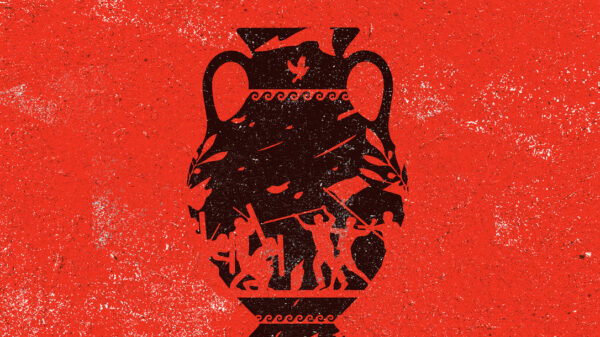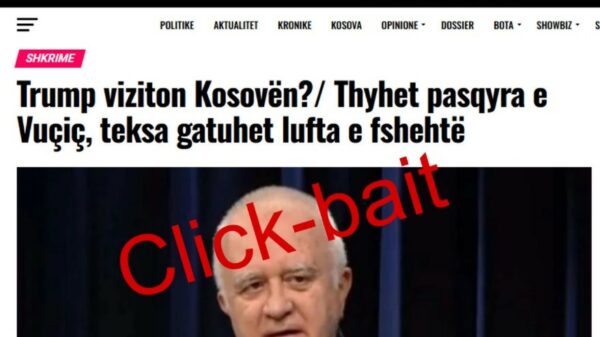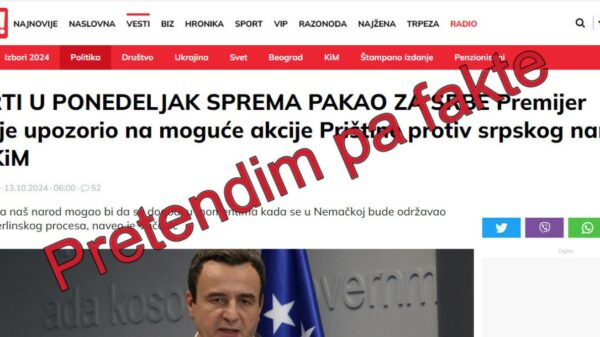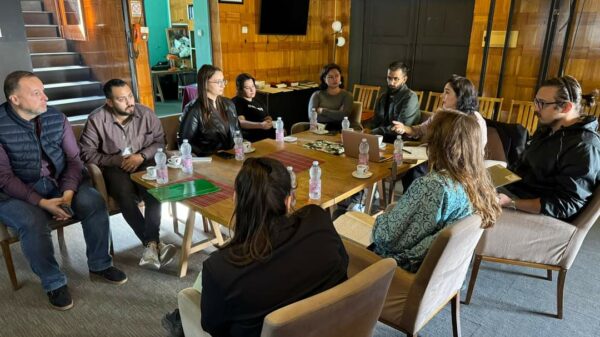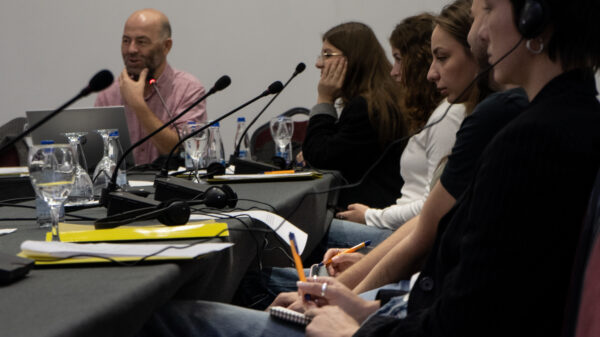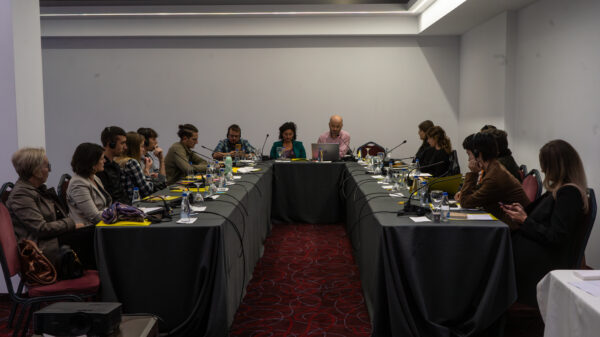The first year of the Kurti government signaled a rough start in foreign policy, being subject to diplomatic mistakes and protocol failures. The situation worsened as the second year unfolded, and Kosovo’s Foreign Minister, Donika Gervalla-Schwarz, proved unfit to lead the Ministry of Foreign Affairs.
In its third year, the situation hasn’t improved. Besides visa liberalization, the Kurti government has failed to achieve any meaningful progress in foreign policy. Kosovo did not gain any new state recognitions or membership in prominent international organizations, making it the only government since 2008 to make no progress in this regard. Kosovo remains the only country that applied for EU membership but still did not receive candidate status.
Simultaneously, Kosovo’s undiplomatic behavior created friction with key allies, as Kosovo grew increasingly more isolated, which culminated in severe consequences and sanctions for the first time ever since it gained independence.
The lack of adequate knowledge and experience from the Kurti government has resulted in stagnation and a deficiency in effective leadership, pushing the government towards reactive diplomacy.
Failing to uphold strategic interests and partnerships
Kosovo’s primary strategic interests in the foreign domain are to pursue Euro-Atlantic integration and nurture strong relationships with its key allies. However, over the last three years, the Kurti government has experienced a divergence from Kosovo’s allies, directly breaching crucial provisions of Kosovo’s national security and defense strategies.
This divide became apparent in May 2023, as the newly-elected mayors from Albanian parties assumed their positions in four northern municipalities. The election had been boycotted by local Serbs, who subsequently impeded the new mayors from entering the municipal buildings. In response, the Kosovo authorities deployed special police units to disperse the crowds, which resulted in a tense situation.
Despite numerous calls for de-escalation by the EU and the U.S., Prime Minister Kurti maintained his course of action. Consequently, the U.S. penalized Kosovo by withdrawing it from the U.S. Army-led annual exercise, Defender 23, and threatened that more consequences could follow. Additionally, the EU hit Kosovo with sanctions in June 2023, including reducing high-level visits and financial cooperation. These sanctions continue to remain intact.
However, the Kosovo government persisted in its efforts to forcibly integrate Kosovo Serbs. In February 2024, Kosovo decided to prohibit the use of the Serbian dinar, which the Serbian government supplies to pay salaries, pensions, social benefits and other payments to Kosovo Serbs. Despite multiple attempts by U.S. and EU officials to persuade Kosovo to withdraw or postpone the decision, Prime Minister Kurti asserted that the decision would not be reversed.
Consequently, this move triggered the most severe criticism that the U.S. government has ever directed against Kosovo. U.S. Assistant Secretary of State for European and Eurasian Affairs, James O’Brien, opely condemned the Kosovo government, raising concerns about the partnership with Kosovo. “I don’t make vague threats in public. I would say that if they do not treat us as a partner, we will not treat the Government of Kosovo as a partner either,” said O'Brien.
Kosovo is a sovereign nation but it remains partially recognized. The consolidation of international legitimacy, through membership in international organizations and gaining new state recognitions, hinges significantly on Western support. Strained relationships with allies deviate Kosovo from successfully pursuing such goals.
Thus, any short-term tactics pertaining to the North require coordination with allies. The U.S. and the EU might not convince Serbia to change its approach vis-a-vis Kosovo, but they can help Kosovo solidify its statehood.
In the long run, this approach will be much more beneficial to Kosovo than jeopardizing its relations with allies for short-term advantages in the north of the country, which creates a false perception of consolidating Kosovo’s sovereignty.
Engaging in scandalous diplomacy
The deployment of special police units in the north of Kosovo to access the municipal buildings faced a strong reaction from the U.S. administration. U.S. Secretary of State, Antony Blinken, delivered a harsh statement, urging Kosovo to change course and refrain from further actions that would incite more tensions. Prime Minister Kurti characterized Secretary Blinken’s press statement as naive, stating: “I think it is not only unfair, wrong and hurtful, but at the same time very naive.”
This undiplomatic approach, however, has been a consistent element of Kurti’s foreign policy. His foreign minister, Donika Gervalla-Schwarz, delivered an interview for Der Standard, accusing EU Special Envoy Miroslav Lajcak of serving Serbia’s interests and demanding the EU to change its personnel. Prime Minister Kurti also reiterated this stance by asserting that Lajcak was siding with Serbia.
It goes without saying that it is within the EU's discretion which diplomats and personnel to appoint. Additionally, blaming EU officials only harms Kosovo in the negotiation process with Serbia. Typically, disputes involving a mediator are resolved through diplomatic channels.
Furthermore, during the Dubrovnik Forum in Croatia, Gervalla-Schwarz labeled the EU as a “paper tiger,” a metaphor used by the former communist Chinese leader, Mao Zedong, to describe the West’s imperialism as strong at first glance but completely powerless on closer examination.
Attempting this approach is futile, considering that the EU is Kosovo’s largest donor and the country is eager to integrate into the EU. In such settings, it is imperative for Kosovo’s foreign minister to emphasize articulating the country’s vision and priorities rather than resorting to making accusations against others.
Gervalla’s scandals didn’t stop there. During the Western Balkans Summit in Tirana in October 2023, Macron delivered a statement on visa liberalization for Kosovo which was mistranslated and soon became subject to misinformation. Instead of using official diplomatic channels to clarify France’s position through Kosovo’s Embassy in Paris, Gervalla-Schwarz immediately jumped to conclusions and sarcastically posted the flag of France with the inscription “Et Voila” (And there you go), pointing fingers at France for another alleged letdown in regards to visa liberalization.
Hiring inexperienced friends as lobbying consultants
After two years of signing no contracts with lobbying firms, the Kurti government has opted for two newly established firms – Aferdita Rakipi Communications and Ambal (represented by Avni Mustafaj), to help its government’s lobbying efforts in Washington D.C.
According to Radio Free Europe, these firms have not had any lobbying agreements previously registered on the U.S. Department of Justice's Foreign Agents Registration Act (FARA). Besides the lack of experience, these firms don’t have formal websites and there is no information on how many staff members work for them.
What is known, however, is that both Rakipi and Mustafaj have close ties to the current government. For instance, Avni Mustafaj has a close connection with Kosovo’s Deputy Foreign Minister, Liza Gashi, who before being appointed deputy foreign minister, was the executive director of NGO Germin, where Avni Mustafaj continues to serve as the co-chair of the board.
Liza Gashi is currently being investigated by the anti-corruption task force, along with Gervalla-Schwarz, for giving 1 million and 40 thousand euros to the Swiss-based organization “Caritas,” which afterward contracted NGO Germin for the delivery of services. These allegations are still being looked into.
Rakipi and Mustafaj will each get 147,000 euros a year for a part-time engagement–a substantial amount of money for individuals who have no previous contractual lobbying experience in Washington D.C.
This development comes as a shock considering years ago, Prime Minister Kurti and his Self-determination party were very vocal against signing hefty contracts with lobbying firms to represent Kosovo’s interests abroad.
Nevertheless, the firms contracted by previous governments were well-established and previous governments managed to secure high-level meetings in Washington D.C. and progress in consolidating Kosovo’s international legitimacy.
However, this is not the case with the current government and this stagnation was confirmed through a leaked document, where the Kosovo ambassador to the U.S., Ilir Dugolli, confirms that the treatment of the Kosovo Embassy in Washington D.C. is “brutal.”
The last three years of Kurti’s foreign policy and Gervalla-Schwarz’s tenure as foreign minister have been marked by notable shortcomings that have adversely impacted Kosovo’s overall effectiveness in foreign policy.










